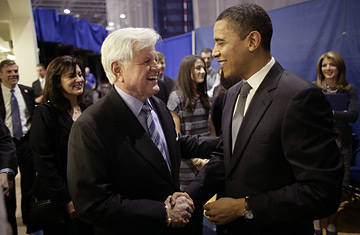
Democratic presidential candidate Barack Obama poses with Senator Ted Kennedy, Monday, January 28, 2007.
Thousands had been lining up outside American University's Bender Auditorium in Washington, D.C., hours before Barack Obama's arrival Monday afternoon. The campaign had initally booked the arena for a rally, but the news that he would be getting the endorsements of three members of the Kennedy clan there had given it the aura of a historic event.
The scene that greeted the candidate backstage could have been a Kennedy family reunion. Ted's branch of the clan had gotten there first. The senator was there with his congressman son Patrick, Ted's wife Vicki, and Vicki's son Curran. Then Caroline arrived with her three teenagers. Teddy's sisters, Eunice Shriver and Jean Kennedy Smith, showed up too, along with an assortment of their children and grandchildren. Through the blue curtains, the crowd was thundering: "Yes. We. Can."
For a moment, Obama looked overwhelmed when he saw all of the Kennedys waiting for him. Then he gathered Caroline in a big hug. "Thank you so much," he whispered. "I'm so excited."
As they prepared to go onstage to declare their support for Obama, Caroline and Ted Kennedy discussed their decisions to support him in exclusive interviews with TIME. Afterward, Obama talked about what the endorsements meant to him, and what they might mean for his chances of becoming President.
Senator Edward M. Kennedy
TIME: Everyone had thought that you would wait until after the Democratic race was more settled after Feb. 5 to endorse a candidate. Why did you decide to do it now?
E.K.: I said for the last year I was always going to support the candidate that inspired. I said that on the Stephanopoulos show and also on Meet the Press and in various interviews. And it always seemed to me that at the start of this campaign there were a number of people that I knew that have absolutely wonderful qualities and are capable to inspire. And a number of them have dropped out. That was just now three weeks ago. So after that period of time, I continued to sort of observe the campaign and it became more apparent to me. It was sort of a growing process about the inevitability of Barack Obama, that he would appeal to the youth, that he had a message of hope and that he had this ability to draw across age lines, between the young and the old, and between the east and the west and the north and the south, between black and white, straight and gay. And it's a process really, isn't it?
And then you come down to the particular issue on time: Is [the right time] today, or is it yesterday, or tomorrow? So by the middle of [last] week, I'd made up my mind.
How did Caroline's decision and yours affect each other?
E.K.: Well, Caroline and I are very close, and she started this process — she could tell you about it — but she started it really last summer. She took her children to listen to all of the candidates, and they were very, very good. They were very thoughtful about it and very knowledgable about it and care very deeply about what's happening in the country. All of which is very, very inspiring. And they talked with me, I remember we had a long lunch in the middle of the summer. They were talking about it at that time; they were talking about Barack Obama.
But Caroline normally hasn't gotten involved in politics.
E.K.: I think what she wrote [on the New York Times op-ed page Sunday] is really what she felt. She wrote that in just a few hours. She writes very quickly, very eloquently and carefully. She introduced me one time at a convention, and she wrote the talk in about three or four hours, and you didn't have to change it a bit. So she writes what she thinks, thinks what she writes, and does it very powerfully, and I think that article really sets it out.
This has been, of course, seen as a rebuke in some ways of the Clintons.
E.K.: I'm for a candidate; I'm for Barack Obama. I have enormous respect for Senator Clinton; I have great respect for President Clinton. I've worked with them on different issues. I have as well with John Edwards. I've worked with him on the Patients Bill of Rights; I worked on the Judiciary Committee [with him]. I would campaign wholeheartedly if they gain the nomination. I indicated that to them. This is about who you're for, not who you're against. That's the way I looked at it.
It's also in some ways a referendum on Clintonism and the 1990s. Isn't it to some degree?
E.K.: It's a referendum on this time. Each of these candidates have virtually similar positions on the great issues, about how are we going to get health care, out of Iraq, about the economy and about education, about global warming. So the issue and the question is, who is going to be able to achieve this and get this done? That gets back to what I had mentioned earlier about the person who inspires. What I've observed and been convinced of in these past weeks is that Barack Obama is uniquely situated to be able to achieve that.
